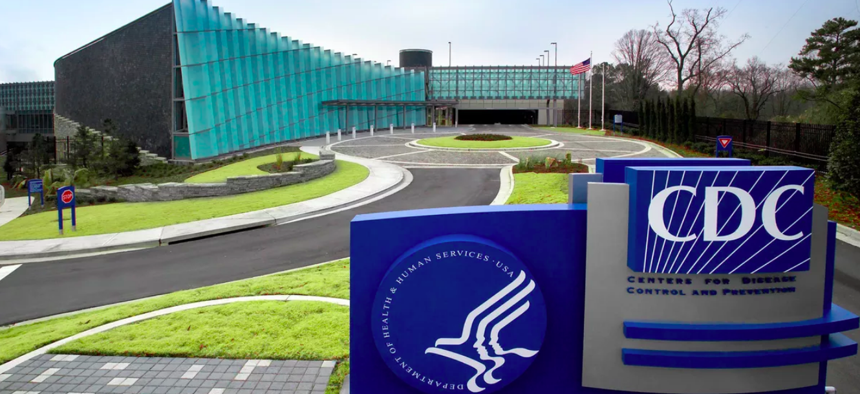
Centers for Disease Control and Prevention
Transparency Groups Seek Probe of CDC ‘Gag Orders’
Office of Special Counsel asked to investigate potential violations of whistleblower protection laws.
A coalition of government accountability and transparency organizations have urged the Office of Special Counsel should initiate an investigation of possible violations of whistleblower laws in the Centers for Disease Control’s recent controversial directive to employees to avoid certain words in preparing the agency’s annual budget.
What critics labeled a “ban” on employing words such as “entitlement,” “diversity,” “transgender,” “fetus” and “evidence-based” could violate appropriations law as well as the 2012 Whistleblower Protection Enhancement Act, according to a Dec. 21 letter sent to OSC.
The letter was signed by dozens of groups affiliated with the Make It Safe Coalition, which includes organizations from across the ideological spectrum, including the National Taxpayers Union and Liberty Coalition on the libertarian right, and Public Citizen and the Union of Concerned Scientists on the liberal left. The coalition also includes whistleblower advocacy groups such as the Government Accountability Project and the Project on Government Oversight.
“We fear the CDC implemented a non-disclosure policy gagging their analysts without recognizing their whistleblower protection rights,” the letter said. News reports this year of three such rules “revealed a policy decision which would constitute an unacceptable infringement on CDC analysts’ free speech rights and threaten the CDC’s mission.”
The letter said that “when an agency unlawfully gags its employees, it threatens Congress’s ability to engage in oversight, hampers citizens’ right to know about threats to public health, safety and the environment, and undermines policy-making that depends on science and evidence-based data.”
CDC officials have said news reports of the seven banned words, based on interviews with anonymous staffers, “mischaracterized” their approach.
“There are no banned, prohibited or forbidden words at the CDC—period,” said the agency’s director, Dr. Brenda Fitzgerald, in a statement emailed to Government Executive on Friday. “I want to emphasize to anyone who may believe otherwise that we continue to encourage open dialogue about all of the important public health work we do. CDC has a long-standing history of making public health and budget decisions that are based on the best available science and data that benefits all Americans—and we will continue to do so. I understand that confusion arose from a staff-level discussion at a routine meeting about how to present CDC’s budget. It was never intended as overall guidance for how we describe and conduct CDC’s work.”
An OSC spokeswoman said the agency could not comment on the letter.
The Trump administration’s efforts to control media contact by employees—a practice also familiar during the Obama administration—has manifested itself in three instances involving CDC or its parent, the Health and Human Services Department, the whistleblower advocates noted.
The Washington Post reported the allegations of banned words in CDC budget documents on Dec. 15. In January, as incoming Trump officials were settling in, the Huffington Post reported that HHS employees were instructed not to send “any correspondence to public officials,” but to refer all inquiries to the department’s leadership. And Axios reported earlier this year that CDC communications staffer Jeffrey Lancashire sent staff a memo in August saying, “Effective immediately and until further notice, any and all correspondence with any member of the news media, regardless of the nature of the inquiry, must be cleared through CDC's Atlanta Communications Office."
The 80 nonprofits in the Make it Safe Coalition argue that, if news reports are accurate, CDC may be in violation of provisions of the 1989 Whistleblower Protection Act, the 2012 Whistleblower Protection Enhancement Act and the 2017 Consolidated Appropriations Act.
“Any prior restraint on free speech has to be accompanied by an addendum” spelling out that the directive “can’t interfere or obstruct whistleblower disclosures,” Tom Devine, legal director for the Government Accountability Project, told Government Executive. “It could crimp someone’s style in blowing the whistle. Such a blanket restriction on communication with the press by prior restraint is anathema to the whistleblower mandate” of the Whistleblower Protection Enhancement Act, Devine added. “It’s a cornerstone of the act and is listed in multiple sections,” whether the documents in question involve the budget or other subjects.
As a remedy, the CDC could modify its restrictions on speech with “supplements to clarify that those restrictions are not applicable” to disclosures under the whistleblower laws, he said. “Until they do that, every penny spent to enforce those restraints is illegal spending and a prohibited personnel practice.”
Since its founding in 1978, the Office of Special Counsel, Devine said, has had the authority to open investigations of prohibited personnel practices without a specific complaint from someone who says “my rights have been violated.” Though seldom used, so-called “sua sponte” investigations can be based on “symptoms of violations,” he said.







